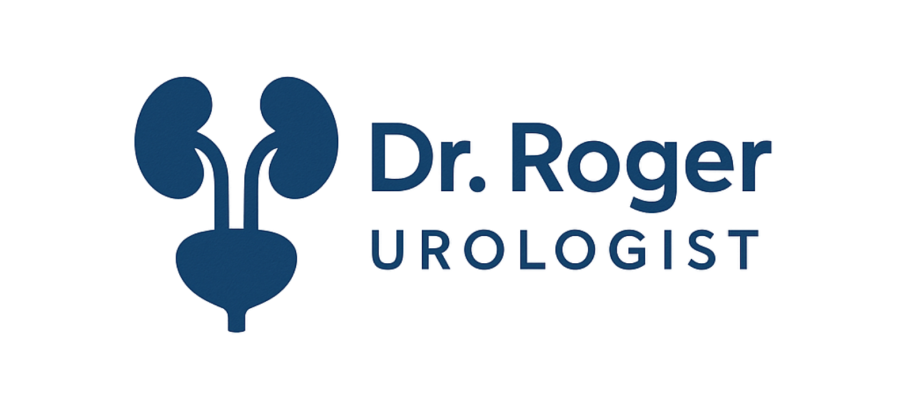Comprehensive Men’s Urology & Prostate Care in Kuala Lumpur
Men’s urological health spans a wide range of conditions — from benign prostate enlargement (BPH) and urinary symptoms to prostate cancer, sexual dysfunction, and fertility issues. At Prince Court Medical Centre in Kuala Lumpur, Dr. Roger offers personalised evaluation and evidence-based treatment tailored to your age, lifestyle, and goals.
This section outlines the most common male urology concerns and the treatment options available — including medical therapies and minimally invasive procedures — to help improve quality of life and long-term outcomes.
Common Conditions Managed
Benign Prostatic Hyperplasia (BPH) – Non-cancerous prostate enlargement that may cause weak urine flow, frequent urination, or incomplete emptying
Elevated PSA (Prostate-Specific Antigen) – Raised PSA levels that may indicate prostate inflammation, enlargement, or cancer risk
Prostate Cancer – Including early detection, biopsy, treatment planning, and long-term follow-up care
Erectile Dysfunction (ED) – Difficulty achieving or maintaining an erection; evaluation and treatment based on underlying cause
Urinary Retention & Weak Stream – Difficulty starting or maintaining urination, often linked to prostate or bladder outlet obstruction
Nocturia – Frequent night-time urination that can disrupt sleep and signal underlying urological issues
Male Fertility Issues – Initial assessment of hormonal or anatomical causes of reduced sperm count or function
Painful Ejaculation or Blood in Semen – Symptoms that may point to inflammation or structural prostate concerns
Key Urology Services for Men’s Health in Kuala Lumpur
Explore the full range of men’s urology services offered by Dr. Roger in Kuala Lumpur — covering early detection, medical therapy, and advanced treatments for prostate health, sexual wellness, and urinary conditions.
PSA Screening & Risk Counselling
Blood testing and personalised prostate cancer risk assessment, especially for men over 50 or those with a family history.
MRI Prostate
Advanced imaging of the prostate used to detect suspicious lesions and guide biopsy or treatment decisions.
PrecisionPoint™ Transperineal Biopsy
A targeted, less invasive biopsy technique performed through the perineal skin — offering better accuracy and lower infection risk.
Rezum™ Water Vapour Therapy
Minimally invasive steam therapy that shrinks excess prostate tissue to relieve urinary symptoms — with low risk of sexual side effects.
TURP (Transurethral Resection of the Prostate)
Surgical removal of obstructive prostate tissue causing urinary issues, commonly used for moderate-to-severe BPH.
Hormone Therapy for Prostate Cancer
Used to reduce testosterone levels as part of prostate cancer treatment. May be used for curative, palliative, or combination strategies.
Vasectomy (Male Sterilisation)
Safe, effective permanent contraception for men. Performed under local anaesthesia as a quick outpatient procedure.
Bladder Function Testing (Uroflowmetry and Urodynamics Testing)
Specialised tests to assess bladder and urinary function, useful for evaluating slow stream, incontinence, or prostate-related symptoms.
Erectile Dysfunction Management
Discreet assessment and treatment options including medications, shockwave therapy, injection therapy, and referral for advanced care when needed.
Prostate Health & Men’s Urology
– Frequently Asked Questions
1. What is the prostate, and what does it do?
The prostate is a small gland found only in men. Located below the bladder, it surrounds the urethra (urine passage). The prostate helps produce fluid that nourishes and transports sperm. As men age, the gland may enlarge and affect urination.
2. What are common signs of prostate problems?
Weak or slow urine stream
Frequent urination, especially at night
Urgency or difficulty starting urination
Feeling of incomplete bladder emptying
Blood in urine or semen
Discomfort in the lower back, hips, or pelvis
These symptoms may indicate benign prostatic hyperplasia (BPH) or, less commonly, prostate cancer.
3. At what age should men start prostate screening?
Prostate screening is usually recommended from age 50, or 45 for men with a family history of prostate cancer or those in higher-risk groups. Tests may include a PSA blood test and sometimes a digital rectal exam (DRE).
4. What is BPH and is it dangerous?
Benign Prostatic Hyperplasia (BPH) is non-cancerous enlargement of the prostate. It commonly affects aging men and may cause bothersome urinary symptoms. While not dangerous, untreated BPH can lead to bladder strain, infections, or kidney problems in some cases.
5. What is a PSA test and what do the results mean?
The PSA (Prostate-Specific Antigen) test measures a protein made by the prostate. Elevated levels may suggest prostate enlargement, inflammation, or cancer — but PSA is not cancer-specific. Further tests (e.g., MRI, biopsy) may be recommended if PSA levels are high.
6. Is prostate biopsy painful or risky?
Modern techniques such as the PrecisionPoint™ transperineal biopsy reduce infection risks and improve cancer detection. The procedure is often done under local or general anaesthesia. Discomfort is minimal, and most patients go home the same day.
7. What are the treatment options for an enlarged prostate?
Treatment options depend on symptom severity and prostate size:
Lifestyle or dietary changes
Oral medications
Minimally invasive options like Rezum™ therapy
Surgical procedures such as TURP
Your urologist will help determine the best approach for you.
8. Does treatment for prostate issues affect sexual function?
Some treatments, especially surgery, may affect sexual function — including ejaculation or erection quality. Minimally invasive options like Rezum™ usually carry a lower risk of sexual side effects, and these are always discussed during planning.
9. Is vasectomy reversible?
Vasectomy is intended as a permanent form of contraception. While reversal is possible in some cases, it is not guaranteed. It is best for men who are certain they do not want more children.
📍 Prostate & Men’s Health services are available with Dr. Roger at Prince Court Medical Centre, Kuala Lumpur.
🗓️ Consultations available from June 2025.
If you’re experiencing urinary symptoms, sexual health concerns, or would like to schedule a prostate screening —
Contact Prince Court Medical Centre via WhatsApp at 📱+6012-999 7262 | Call 📞 +603-2160 0000 | 💻 Appointment form




